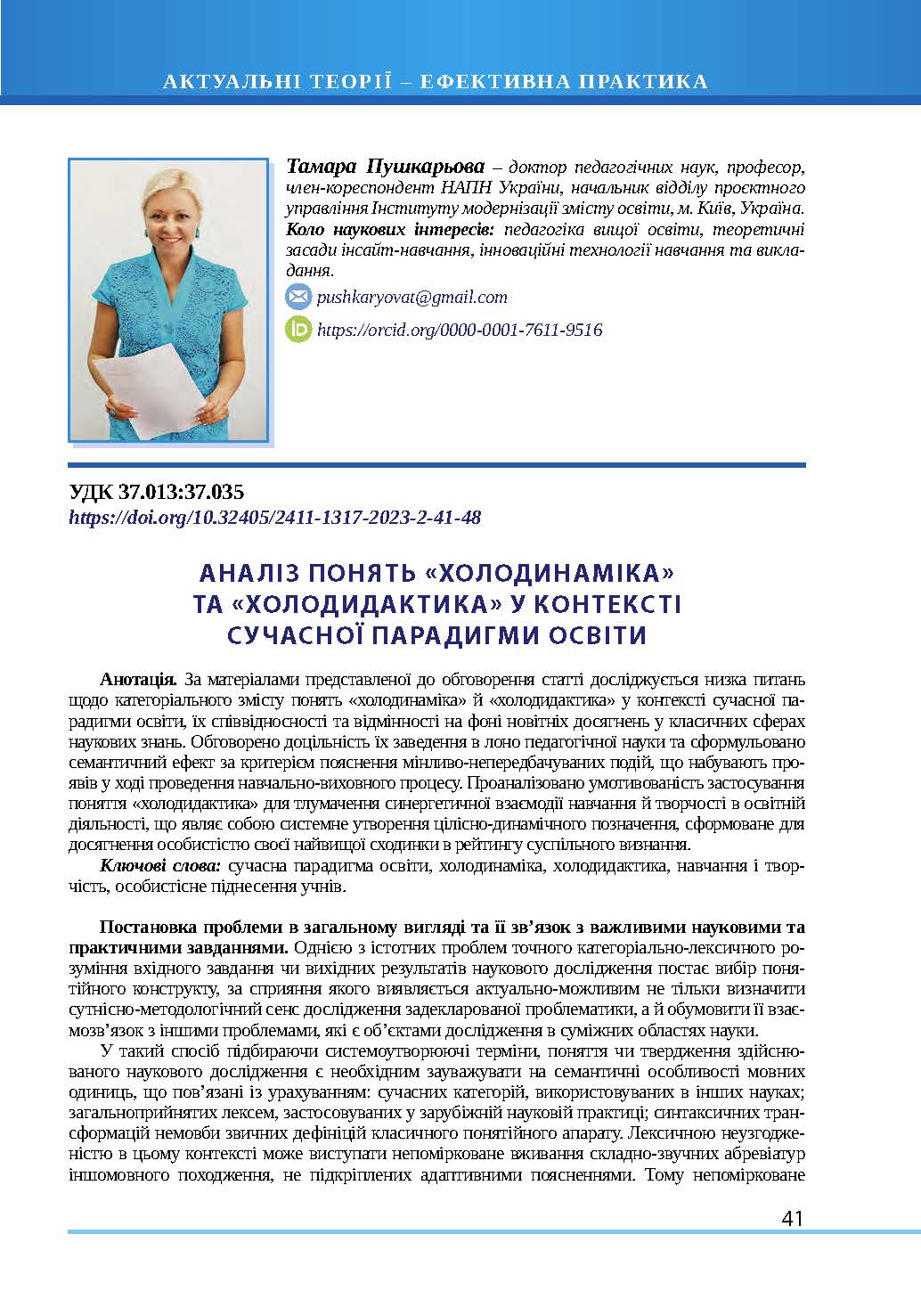Abstract
Based on the materials of the article presented for discussion, a number of questions regarding the categorical meaning of the concepts of «holodynamics» and «holodidactics» in the context of the modern paradigm of education, their correlation and differences against the background of the latest achievements in the classical spheres of scientific knowledge are investigated. The expediency of introducing them into the bosom of pedagogic science was discussed and the semantic effect was formulated according to the criterion of explaining changeable and unpredictable events that manifest themselves during the educational process. The motivation for using the concept of «holоdidatics» for the interpretation of the synergistic interaction of learning and creativity in educational activity is analyzed, which is a systemic formation of a holistic-dynamic designation, formed for the individual to achieve his/her highest step in the rating of social recognition.
It has been established that holodynamics is a phenomenon that describes the dynamic movement in the space of a unified formation, in the structure of which the central and system-forming core is the inner potential of the individual or his/her life-affirming «I», which is born, grows and unfolds according to the conscious or subconscious choice of the individual him(her)self. In this way, the mental-psychic apparatus of a person is a kind of personal computer, which has its own Internet connection with the Universe and correlates human actions with the generalizing Order of Nature.
Considering holodidactics in a practical sense, the article presented a model of «cooperation» of rational (initial) and intuitive (creative) activity of students, which reveals the holistic unity of various vector directions of activity in the plane of the educational process.
Given that activity, both educational and creative, should be considered in the context of a certain person’s ability to interact with something, take an active part in something or carry out vigorous activity, it turns out that rational and intuitive activity are to some extent identical concepts. Meanwhile, since different forms of activity cannot be carried out at the same time, educational and creative activity under actual circumstances can be manifested exclusively in different counting intervals and have different time frames. At the same time, various types of activities can be directed in different spatial directions, and therefore demonstrate positive or negative dynamics
References
Березюк, О.С., Власенко, О.М. (2017). Дидактика: теорія і практика. Житомир: Видавництво ЖДУ ім. Івана Франка.
Білодід, І.К. (ред.). (1970). Словник української мови: в 11 т. Т. 2 .Київ: Наукова думка.
Вознюк, О.В. (2012). Педагогічна синергетики: ґенеза, теорія і практика: монографія. Житомир: Вид-во ЖДУ ім. Івана Франка.
Вульф, Вернон. (1995). Холодинаміка: Вся сила в дії. URL: http://secret-of-success.top/index.php?part=5570.
Малафіїк, І.В. (2005). Дидактика: навчальний посібник. Київ: Кондор.
Пушкарьова, Т.О. (2022). Понятійний конструкт «релятивістська педагогіка» як важливий чинник новочасної освітньої парадигми. Український педагогічний журнал, 4, 112‒120.
Савченко, О.Я (2013). Дидактика початкової школи. Київ: Грамота, 2013.
Цехмістро, І.З. (2002). Холістична філософія науки. Суми: Університетська книга.
Berezyuk, O.S., Vlasenko, O.M. (2017). Dy`dakty`ka: teoriya i prakty`ka. Zhy`tomy`r: Vy`davny`cztvo ZhDU im. Ivana Franka. (in Ukrainian).
Bilodid, I.K. (red.). (1970). Slovny`k ukrayins`koyi movy`: v 11 t. T. 2 .Ky`yiv: Naukova dumka. (in Ukrainian).
Voznyuk, O.V. (2012). Pedagogichna sy`nergety`ky`: g`eneza, teoriya i prakty`ka: monografiya. Zhy`tomy`r: Vy`d-vo ZhDU im. Ivana Franka. (in Ukrainian).
Vul`f, Vernon. (1995). Xolody`namika: Vsya sy`la v diyi. URL: http://secret-of-success.top/index.php?part=5570. (in Russian).
Malafiyik, I.V. (2005). Dy`dakty`ka: navchal`ny`j posibny`k. Ky`yiv: Kondor. (in Ukrainian).
Pushkar`ova, T.O. (2022). Ponyatijny`j konstrukt «relyaty`vists`ka pedagogika» yak vazhly`vy`j chy`nny`k novochasnoyi osvitn`oyi parady`gmy`. Ukrayins`ky`j pedagogichny`j zhurnal, 4, 112‒120. (in Ukrainian).
Savchenko, O.Ya (2013). Dy`dakty`ka pochatkovoyi shkoly`. Ky`yiv: Gramota, 2013. (in Ukrainian).
Cexmistro, I.Z. (2002). Xolisty`chna filosofiya nauky`. Sumy`: Universy`tets`ka kny`ga. (in Ukrainian).

This work is licensed under a Creative Commons Attribution-NonCommercial-ShareAlike 4.0 International License.


